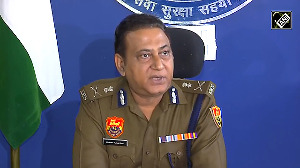
The BrihanMumbai Municipal Corporation's slum demolition drive has provoked serious objections from non-government organisations and political parties.
The Maharashtra government has also faced severe criticism for having gone back and forth on its slum policy. Even though the state administration promised to demolish only those structures which were erected after January 1, 2000, officials failed to ensure this guideline was adhered to. Structures erected before the cut-off date were also destroyed.
Slum-Bay: Found and Lost| Mumbai's manic makeover
The demolition drive slowed down after Congress party president Sonia Gandhi spoke to Maharashtra Chief Minister Vilasrao Deshmukh.
The lack of a relocation plan for the homeless is one of the major flaws of the drive, experts say.
Magsaysay Award winner Jockin Arputham is one of the few activists who have stepped forward to help those who have been displaced by the demolition drive. His NGO plans to provide the shanty dwellers an alternative pay-and-use housing facility.
rediff.com Senior Correspondent Vijay Singh spoke to Arputham about the controversial demolitions and how he plans to help the homeless.
Do you think the Vilasrao Deshmukh government is justified in carrying out the demolitions?
This is not the first time the state government is carrying out such a drive. The difference lies in the inhuman way it is being executed. This time round, the authorities are hellbent on clearing the slums without charting an alternative housing plan for the victims. It is unfair on the slum dwellers.
You proposed a rehabilitation plan to the government.
I requested the government to allot vacant plots for rehabilitating the slum dwellers. The authorities have accepted my proposal and are willing to allot land pockets in various places totalling up to 250 acres.
These temporary settlements will be divided into 10 by 15 square feet plots per family. The families can build their homes on the plot. We will provide basic services for Rs 5 per day. They can live in these settlements as long as they want to for a fee. They don't need to provide any documental proof for land allotment.
I have asked the government to convert all the slums into pay-and-use plots; this should solve the problem permanently.
Demolitions will continue | Mumbai 2020: Dream or nightmare?
Do you think these demolitions affect the children who live in the slums?
Of course, the kids will get affected. It is unfair that the government is breaking the backs of the poor. If you take a house away from a child it will definitely have an effect on her/his growth. And it will, most definitely, affect their education. The authorities have turned a blind eye towards the problems of the poor. This is why I think the drive is inhuman.
Could you give us a background of the slum dwellers? Where do they come from? And what do they do?
Over thousands of people migrate to Mumbai daily from different parts of the country because of the better employment opportunities in the city. Most of them undertake construction, labour work or sell garbage. These people are unable to afford proper housing, so they occupy vacant plots.
What the government fails to understand is that these poor people also contribute to the economy and it is the government's responsibility to provide for their shelter.
Do you think the government deliberately ignores the problems of the poor?
No government ever takes the poor seriously. Although most of their policies are based on the upliftment of the poor, not many implement these projects. Even though the government gets loans from foreign countries for the development of the poor, the poor don't benefit.
Our prime minister has asked the World Bank for a loan of $70 billion. But how these funds are actually utilised for the benefit of the poor is yet to be seen.
Do you think the poor are reduced to a mere vote bank?
It is a fact that all the poor cast their vote mainly for acquiring voting identity cards, which proves that they reside in Mumbai. Unfortunately, the political parties use this for their benefit. After the election, they are forgotten. Even the present government offered to legalise the slums that were set up before January 1, 2000. However after the election, these slums were demolished.
Medha Patkar booked | Salaam Mumbai!
What are the statistics? How many slums are there in Mumbai? How many inhabitants?
Mumbai has over 3,000 slum pockets, which provides housing to 6.8 million people. Due to inflation, even the slums have become overcrowded forcing the new immigrants to move away from the city to the outskirts like New Bombay, Panvel and Virar.
People also live on the pavements in Mumbai.
At least 27,000 families live on the footpaths ( pavements). This is a fairly new occurrence. We have started to relocate these people to other settlements. With the help of the state government, we built 12,000 houses at Vashi, Mankhurd, Govandi, Wadala and Dharavi. Soon we will relocate them from the footpaths.
This plan to remodel Mumbai like Shanghai.
It is difficult to remodel Mumbai like Shanghai basically because these cities are extremely different -- culturally, geographically and economically. Therefore, efforts should be made to develop Mumbai based on its own peculiar demographics -- population, culture and employment opportunities.
Will the demolitions help the city's development process?
Ninety percent of the cleared land will not be developed because the government does not have the capital, the mechanism or a plan to execute it. These plots belong to various administrative authorities so it is difficult for the government to use it for any one development project. I doubt if it will help in the development of the city.
What role does your NGO play in rehabilitating the poor?
We have charted a plan to rehabilitate the slum dwellers under the banner of the National Slum Dwellers Federation and the Society for the Promotion of Area Resource Centres. We are also inviting like-minded people to join us.
Do you think your rehabilitation plan will benefit the slum dwellers?
Of course, it will benefit the people. We are actually providing houses for those who have lost it. And it is not necessary to live in the city. I think having a house on the outskirts is better than not having one at all.
Photograph: Jewella C Miranda | Image: Rahil Shaikh





 © 2025
© 2025